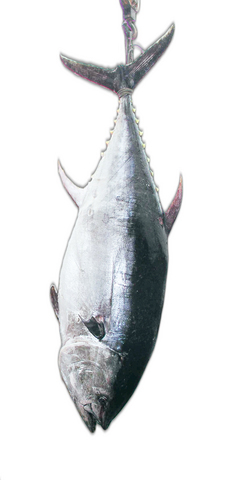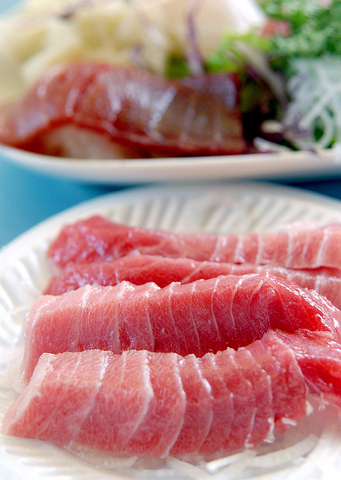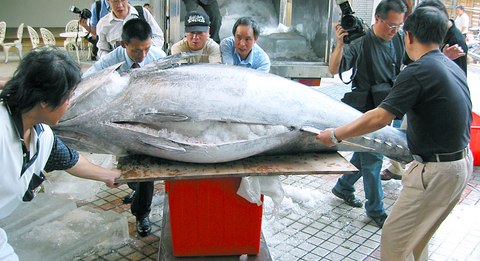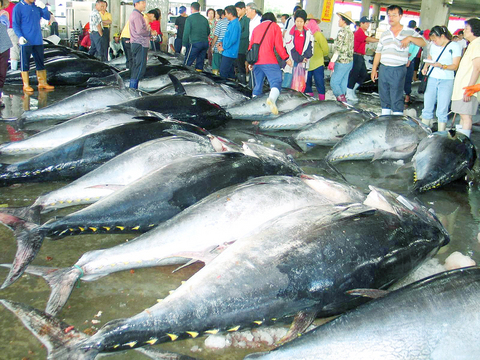Ernest Hemingway was a freshwater fisherman until 1921 when he caught his first glimpse of a bluefin tuna in Vigo, Spain. The giant fish leaped "clear of the water and fell again with a noise like horses jumping off a dock," Hemingway wrote. Afterwards, the novelist became an ocean angler.
These days, the bluefin tuna's commercial value has utterly eclipsed its aesthetic appeal. According to Oceana, a US-based ocean conservation group, the bluefin tuna is the world's most expensive fish, with Tokyo fish dealers raking in between US$100 and US$220 (NT$7,000) per kilogram of the fish.
This year, the market value of prime bluefin belly meat is about NT$4,000 per kilogram in Taipei, according to the Ocean Ranch Corp (海洋牧場有限公司), a fish dealer in the Taipei Fish Market (台北魚市). "A whole bluefin weighing over 250kg could fetch up to NT$300,000 (US$10,000) [wholesale] in Taiwan," Ocean Ranch employee Li Kun-he (李坤和) told the Taipei Times. While that's considerably cheaper than the US$50,000-plus price tags of whole bluefin tunas in Tokyo fish auctions, any food fish selling at ten grand a pop will spawn big business anywhere. And Taiwan is no exception.

The nerve center of the country's bluefin trade is Tungkang (東港), Pingtung County, where every year from May to July, Taiwan's longliners haul in mammoth fish worthy of Hemingwayesque prose. With their cobalt blue backs and metallic luster, these tunas certainly look like one of God's costlier creations. So popular is the fish that Tungkang hosts a six-week festival every year to celebrate it. The Pingtung Bluefin Tuna Cultural Festival, held from May to June, features sculptures and seafood, with bluefin tuna sashimi being the big draw. Celebrities and politicians are often on hand to host tuna auctions to kickstart the bluefin revelry. Last year, President Chen Shui-bian (陳水扁) auctioned off three bluefin tunas for NT$15 million at the festival.
The underside of the bluefin tuna industry, however, is a lot darker than the snowy white belly of the fish itself. With 90 percent of all mature predatory fish gone from the world's oceans, according to a 2003 Nature article, the bluefin is feared to be nearing extinction in the wild. The world's most commercially valuable fish, in addition to being ecologically controversial, also increasingly represents a flashpoint among major fishing countries as its numbers dwindle.
A recent case in point is the detention of seven Taiwanese fishing vessels and their operators by Philippine authorities. In another four cases last month, boats and crews were detained by Philippine military personnel pending payment of a ransom. According to local media, the Taiwanese boats were fishing for bluefin tuna in disputed waters near the Philippines. Taiwanese fishing vessels are regularly detained by neighboring countries, and are routinely shot at by Philippine authorities. Recent fishing-related clashes, including an incident last January in which Philippine maritime police opened fire on a Taiwan fishing vessel, killing its captain, have fueled speculation that the Pingtung Bluefin Tuna Cultural Festival, meant to boost the county's fishing industry, is also contributing to such confrontations on the open ocean. Peter Ho (何勝初), president of the Overseas Fisheries Development Council of the Republic of China (OFDC, 中華民國對外漁業發展協會), in an interview with the Taipei Times, admitted that the festival and the huge demand that it creates could be triggering the confrontations, and that the OFDC's efforts to educate Taiwanese fishermen as to where they should not venture have not been very successful. "Some fishermen go too far," Ho said.

PHOTO: LU CHUN-WEI, TAIPEI TIMES
So pressing is the overfishing problem -- especially with regard to the bluefin -- that the World Trade Organization (WTO) is taking steps to address it by holding negotiations on national fishery subsidies, which are believed to encourage overfishing.
"The WTO fisheries subsidies negotiations are particularly significant because it is the first time that conservation considerations have led to the launch of a trade negotiation. That is, world trade ministers, recognizing the problem of global overfishing, [have] committed to discuss[ing] trade rules regarding fisheries subsidies [since 2001] as a way to help address this issue," Oceana CEO Andrew Sharpless told the Taipei Times.
With one of the biggest fishing fleets in the world, Taiwan has been harshly penalized with fishing quotas and other restrictions by international fishery organizations. These measures have been justified by Taiwan's reputation for poaching and otherwise breaking the rules.

PHOTO: MAX HIRSCH, TAIPEI TIMES
An Australian government-funded report obtained by the Taipei Times from TRAFFIC, an international wildlife trade monitoring organization, probes Taiwan's Flag of Convenience (FOC) fishing industry. The 2005 report, entitled The Changing Nature of High Seas Fishing: how flags of convenience provide cover for illegal, unreported and unregulated fishing, singles out Taiwan in many instances as a major violator of international deep-sea fishing regulations. According to the report, the vast majority of large-scale fishing vessels built in Taiwan and operated by Taiwanese businesses from 2001 to 2003 operated under other countries' flags; many fishing vessels of Taiwanese origin were even listed as "flag unknown." While flying an FOC in itself is not illegal, it does provide ideal cover for "illegal, unreported and unregulated" (IUU) fishing activities, which the report describes as a US$1.2 billion a year industry. "The FOC system serves as a very inexpensive and often deliberate means for vessels ... to evade the rules and make enormous profits," the report states. The profitability of IUU fishing may explain why Taiwan is home to the largest number of companies that own or operate large-scale fishing vessels that are flagged to other countries. The Kaohsiung-based Lien Cherng Shipbuilding Co Ltd (聯成造船股份有限公司), for example, is cited in the report for churning out FOC fishing vessels that are suspected internationally of engaging in IUU fishing activities.
As penance for what conservationists and international fishery authorities say are Taiwan's sins on the high seas, the country submitted to a drastic Atlantic big-eye tuna quota slash imposed by the International Commission on Conserving Atlantic Tuna (ICCAT) last year. The commission said Taiwan violated international tuna conservation regulations by overfishing big-eye tuna in the Atlantic and "fish laundering." The commission passed Japan's proposal to cut Taiwan's allowable catch of big-eye tuna by a staggering 70 percent, leading to huge revenue losses, but stopped short of implementing Japan's request to slap a zero quota on Taiwan for other kinds of tuna.
That the ICCAT implements such measures is an indication of how the international community views Taiwan's fishing fleet: In the eyes of many, Taiwanese fishermen are stripmining the oceans of their fishery resources.

PHOTO: LI LI-FA, TAIPEI TIMES
However, according to Ho, Taiwan's reputation among fishing nations is undeserved. Ho attributes what he refers to as the Taiwanese fishing fleet's bum rap to the country's lack of diplomatic recognition worldwide, which prevents it from joining most global fishery organizations as a full-fledged member. Getting locked out of such rulemaking bodies makes Taiwan a convenient scapegoat for countries like Japan, said Ho. "Japan took advantage of our weak situation," Ho told the Taipei Times. Japan proposed the quotas to corner the tuna market and stem cheap tuna imports from Taiwan, which were driving tuna prices down in Japan, Ho said, adding that Japan is itself embroiled in fishing disputes and controversy. "If we were a member [of international fishery organizations], things would be different," Ho said. "In such organizations, what can a non-member nation like Taiwan do when members draw up regulations that penalize you?"
Despite what Ho refers to as unfair treatment by global fishery authorities, Taiwan's government and tuna fisheries industry are financing a "drastic" fishing vessel buy-back program to the tune of NT$6.6 billion (US$200 million) to appease the international community.
With regard to the bluefin, Ho said that the tonnage of annual northern bluefin tuna catches for Taiwan and Japan is decreasing, but refused to concede that this is because the bluefin is nearing extinction. "Numbers are declining for many fish species, but whether that's due [solely or mostly] to fishing has yet to be proven," Ho said. The OFDC president also took issue with the Nature article that claims that 90 percent of the oceans' "big" fish are gone. "That article is very controversial, and a lot of scientists have come out against the research presented in it," Ho said, adding that although he thinks overfishing is a problem globally, "Taiwan [itself] doesn't pose a problem."
Tsay Tzu-yaw (蔡日耀), director of the Deep Seas Fisheries Division of the Fisheries Agency (FA, 漁業署遠洋組) under the Council of Agriculture (COA, 農業委員會) pointed out that the Australian government-funded report disregards the fact that the FA has urged 48 large-scale Taiwanese-owned FOC fishing vessels to discard their foreign flags and fly the Taiwanese flag since 2000. Meanwhile, the government has implemented a number of stringent measures to crack down on IUU fishing activities. A US$200 million program to buy back large-scale tuna vessels to shrink the fleet is the latest effort in a series of vessel reduction programs since 1991, Tsay said. Additionally, measures that include putting scientific observers on large-scale tuna boats and keeping an eye on the fleet via tracking technology are helping the government keep its fishermen in line.
"Taiwan is determined to be a responsible fishing state, and we are confident that our tuna longline vessels' catches are commensurate with the catch quotas allocated by regional fisheries management organizations," Tsay said. Indeed, recent FA measures to downsize the fleet and keep fishing activities legitimate suggest that Tsay is not merely paying lip service; Taiwan appears to genuinely want to be a "responsible stakeholder" in the international fishing community.
That's good news if you're a bluefin tuna.
However, when it comes to a fish that routinely ignites geopolitical fires, and that can even lead to murder on the high seas, ensuring its sustainablity is easier said than done.

June 23 to June 29 After capturing the walled city of Hsinchu on June 22, 1895, the Japanese hoped to quickly push south and seize control of Taiwan’s entire west coast — but their advance was stalled for more than a month. Not only did local Hakka fighters continue to cause them headaches, resistance forces even attempted to retake the city three times. “We had planned to occupy Anping (Tainan) and Takao (Kaohsiung) as soon as possible, but ever since we took Hsinchu, nearby bandits proclaiming to be ‘righteous people’ (義民) have been destroying train tracks and electrical cables, and gathering in villages

Swooping low over the banks of a Nile River tributary, an aid flight run by retired American military officers released a stream of food-stuffed sacks over a town emptied by fighting in South Sudan, a country wracked by conflict. Last week’s air drop was the latest in a controversial development — private contracting firms led by former US intelligence officers and military veterans delivering aid to some of the world’s deadliest conflict zones, in operations organized with governments that are combatants in the conflicts. The moves are roiling the global aid community, which warns of a more militarized, politicized and profit-seeking trend

The wide-screen spectacle of Formula One gets a gleaming, rip-roaring workout in Joseph Kosinski’s F1, a fine-tuned machine of a movie that, in its most riveting racing scenes, approaches a kind of high-speed splendor. Kosinski, who last endeavored to put moviegoers in the seat of a fighter jet in Top Gun: Maverick, has moved to the open cockpits of Formula One with much the same affection, if not outright need, for speed. A lot of the same team is back. Jerry Bruckheimer produces. Ehren Kruger, a co-writer on Maverick, takes sole credit here. Hans Zimmer, a co-composer previously, supplies the thumping

Dr. Y. Tony Yang, Associate Dean of Health Policy and Population Science at George Washington University, argued last week in a piece for the Taipei Times about former president Ma Ying-jeou (馬英九) leading a student delegation to the People’s Republic of China (PRC) that, “The real question is not whether Ma’s visit helps or hurts Taiwan — it is why Taiwan lacks a sophisticated, multi-track approach to one of the most complex geopolitical relationships in the world” (“Ma’s Visit, DPP’s Blind Spot,” June 18, page 8). Yang contends that the Democratic Progressive Party (DPP) has a blind spot: “By treating any